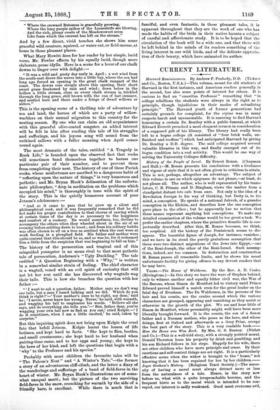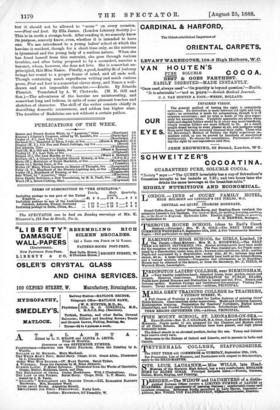Tmass.—The House of Walderne. By the Rev. A. D. Crake.
(Rivingtons.)—In this story we leave the wars of Stephen behind, only to witness another and equally bitter civil war, the War of the Barons, whom Simon de Montfort led to victory until Prince Edward proved himself a match even for the great leader on the fatal day of Evesham. The De Waldenaes, in the persons of the heir and his cousin, are the centre around which the various characters are grouped, appearing and vanishing as they assist or otherwise in the growth of the plot. We see and hear little of
Simon de Montfort, whose personality might well have been more liberally brought forward. It is the cousin; the son of a Saxon
father and a Norman mother, who poses as the hero, and whose doings, first at Oxford and afterwards as a Grey Friar, occupy the best part of the story. This is a very readable book.— o
Hot _the Home was Won Back. By Mrs. G. S. Reaney. (Nisbet and Co.)—This is a well-told story, with a strongly pointed moral. Donald Thornton loses his property by drink and gambling, and his son Richard follows in his steps. Happily for his wife, there are other children who have more principle and sense. By their exertions and self-control things are set right. It is a particularly effective scene when the widow is brought to the "home," not knowing that it has been regained for her by her children.— Joyce Graham's History. (Religious Tract Society.)—The neces- sity of having a moral must always detract more or less from the naturalness of a tale. Hence, in the story now before us, what with a quite irreproachable heroine, and the frequent hints as to the moral which is intended to be con- veyed, our interest is sadly weakened. Good must overcome evil, but it should not be allowed to " score " on every occasion. —.First and Last. By Ella James. (London Literary Society.)— This is in sooth a strange book. After reading it, we scarcely know its purpose, scarcely know, even, whether it is intended to have one. We are introduced to a young ladies' school at which the heroine is resident, though for a short.time only, as the mistress is tyrannical and the young lady of a restless nature. When she has freed herself from this restraint, she goes through various troubles, and after being proposed to by a scoundrel, marries a baronet, whom, however, she does not love. She is somewhat un- principled, this Miss Nance Finally, a good, healthy fit of jealousy brings her round to a proper frame of mind, and all ends well. Though containing much superfluous writing and much curious prose. First and Last is a somewhat clever story, and Nance a well- drawn and not impossible character.—Reseda. By ZinaIde Fletuiot. Translated by A.. W. Chetwode. (M. H. Gill and Son.)—The adventures of the heroine are uninteresting, and somewhat long and tedious, in spite of some pleasant touches and sketches of character. The skill of the writer consists chiefly in describing domestic occurrences, and seldom has higher aims. The troubles of Madeleine are not without a certain pathos.



































 Previous page
Previous page